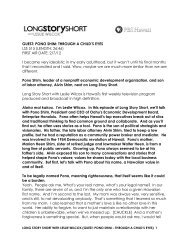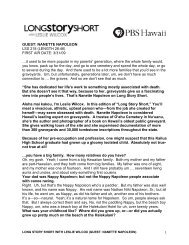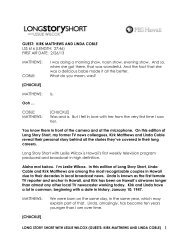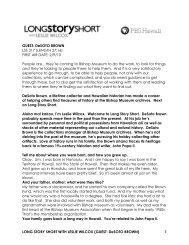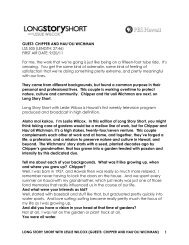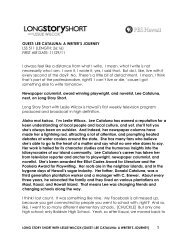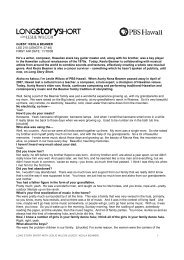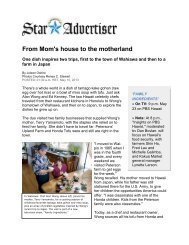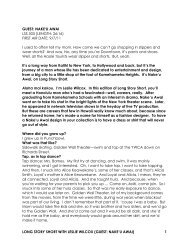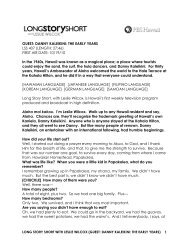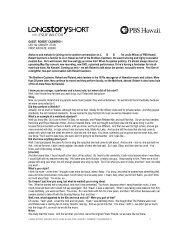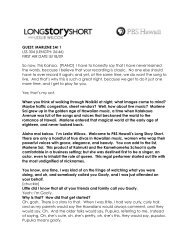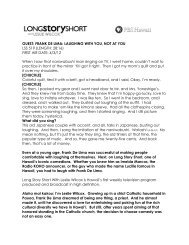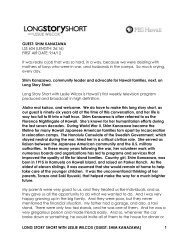guests: eddie and myrna kamae - PBS Hawaii
guests: eddie and myrna kamae - PBS Hawaii
guests: eddie and myrna kamae - PBS Hawaii
Create successful ePaper yourself
Turn your PDF publications into a flip-book with our unique Google optimized e-Paper software.
GUEST: EDDIE AND MYRNA KAMAE<br />
LSS 502 (LENGTH: 26:46)<br />
FIRST AIR DATE: 7/26/11<br />
EDDIE: Kawena told me, “Everything you’ll be doing in your lifetime, your wife<br />
Myrna will be helping you.”<br />
MYRNA: And it’s always interesting when you’re around Eddie. You don’t know<br />
what he’s gonna want to do next, what project or what thing’s gonna happen.<br />
So I found it really exciting.<br />
Celebrated musician <strong>and</strong> filmmaker, Eddie Kamae, <strong>and</strong> producing partner <strong>and</strong><br />
wife, Myrna; next, on Long Story Short.<br />
Long Story Short with Leslie Wilcox is <strong>Hawaii</strong>’s first weekly television program<br />
produced <strong>and</strong> broadcast in high definition.<br />
Aloha mai kakou. I’m Leslie Wilcox. Life partners in work <strong>and</strong> marriage for<br />
almost a half century, Eddie <strong>and</strong> Myrna Kamae have earned national acclaim<br />
for preserving on film some of <strong>Hawaii</strong>’s unique cultural treasures. The Kamaes<br />
credit many individuals, whose gifts of knowledge <strong>and</strong> generous support have<br />
culminated in the establishment of their <strong>Hawaii</strong>an Legacy Foundation.<br />
[SINGING]<br />
Eddie Kamae has distinguished himself as a singer, musician, composer, author,<br />
<strong>and</strong> film director. As a key figure in the <strong>Hawaii</strong>an cultural renaissance, Eddie<br />
was already famous for his virtuoso playing of the ukulele, when he joined forces<br />
in 1959 with the legendary singer <strong>and</strong> slack key guitar master, Gabby Pahinui,<br />
along with bassist Joe Marshall <strong>and</strong> steel guitarist David “Feet” Rogers, to form<br />
The Sons of <strong>Hawaii</strong>. Edward Leilani Kamae was born in Honolulu in 1927 to a<br />
family comprised of ten children. Eddie’s musical path was influenced in part by<br />
his father, Samuel Hoapili Kamae. Eddie Kamae’s mother, Alice Ululani Opunui,<br />
explained her kindness towards strangers, telling Eddie that, “All these things we<br />
do for each other, we feed them more than food; we’re feeding the soul”. It’s a<br />
philosophy that has informed the work of Eddie <strong>and</strong> Myrna Kamae throughout<br />
the decades.<br />
EDDIE: There was this boy sleeping in the park, <strong>and</strong> so my mother tell me, You go<br />
get him <strong>and</strong> bring him here. So I go there, I go—I woke him up. Mister, mister.<br />
LONG STORY SHORT WITH LESLIE WILCOX (GUESTS: EDDIE AND MYRNA KAMAE) 1
Yeah. Come, come, my mother wants to see you. So he picked up his things,<br />
<strong>and</strong> he came to the house.<br />
How old was he?<br />
EDDIE: In his teens. And so, he came to the house, <strong>and</strong> my mother said, “You<br />
don’t sleep there anymore, you sleep here”. Now, we all sleep in the living<br />
room, you know, so he’s going sleep next to us now. We get nine brothers now,<br />
you know. I go, “Oh, wow”. But that’s the way it was. He stayed with us all that<br />
time. As the years went by, one day the father came by. And the father<br />
wanted to take his son home, but he didn’t want to go. See, he wanted to stay<br />
with my mother because he felt my mother adopted him. He said he didn’t<br />
want to go, so the father don’t want to leave. So my father went out <strong>and</strong> told<br />
the father, Go, leave. So the father left, <strong>and</strong> that was the end of the father, <strong>and</strong><br />
he stayed with me <strong>and</strong> brothers, <strong>and</strong> my mother at our place.<br />
What was his name?<br />
EDDIE: Peter; Peter Woo.<br />
And what happened to him? What became of Peter Woo?<br />
EDDIE: Well, I think he got married <strong>and</strong> settled down somewhere. See, my<br />
mother, she just loves people. No matter who they are.<br />
Was your dad like that too?<br />
EDDIE: My father was strictly a man that minds his own business.<br />
But he would allow your mom to bring in—<br />
EDDIE: Oh, yes.<br />
—people to eat <strong>and</strong> share.<br />
EDDIE: He won’t stop that. He was part Cherokee Indian. He just come <strong>and</strong> go.<br />
But he always told all of us, “What I want from you, you are to respect the elders,<br />
no matter who they are. If they’re hungry, you feed them”. And always, he<br />
said, “And you help them”. [SINGING]<br />
How did you learn to play the ukulele?<br />
EDDIE: Well, my brother Joe. My oldest brother was a bus driver, found a ukulele<br />
on the bus, brought it home. My brother Joe would tune the instrument <strong>and</strong><br />
play, so I liked to listen to that sound that he was doing. Well, he put the<br />
instrument down, so I figured, I watched him while he was playing the chord<br />
progressions. And so, when he go to work, so I go get the ukulele, I sit next to<br />
the radio, I turn on the radio, whatever music is, I just strum away, just feel like I’m<br />
playing with the music. But I’m just enjoying myself. Those days, yeah. That’s<br />
what got me involved in music. See?<br />
Do you think you were good, right from the beginning?<br />
EDDIE: Well, I thought so, myself.<br />
[CHUCKLE] And you were actually playing songs from the beginning?<br />
EDDIE: Yes. I just listened to the music. See, it was music by—well, I love Spanish<br />
music, yeah, because it was Xavier Cugat. His music. And I love one song that<br />
he plays all the time, <strong>and</strong> I followed him. So it was titled “Porque?” See? And I<br />
loved the song, so I just followed him. But the rhythm section is what I liked. See,<br />
LONG STORY SHORT WITH LESLIE WILCOX (GUESTS: EDDIE AND MYRNA KAMAE) 2
I just listen to the rhythm, <strong>and</strong> I just play the rhythm. The feeling of it, you know.<br />
So, then my father would take me to the jam session, Charley’s Cab, right on<br />
King Street right across the <strong>Hawaii</strong>an Electric building. So they had this taxi st<strong>and</strong><br />
there, so my father would take me over there on Fridays <strong>and</strong> Saturdays. That’s<br />
where all the entertainers would come <strong>and</strong> sing, <strong>and</strong> play music. So I go over<br />
there <strong>and</strong> play my ukulele. And what I liked about the whole idea, people<br />
throw money on the stage, <strong>and</strong> the musicians pick it up <strong>and</strong> put it in my pocket.<br />
I liked that. [CHUCKLE]<br />
Good incentive.<br />
EDDIE: Oh, yes. So I just play, <strong>and</strong> my father just smile, he’s happy. So then he<br />
takes me back the next day. Then I can see that in him, until one day he asked<br />
me, “You should play <strong>and</strong> sing <strong>Hawaii</strong>an music”. And I told my father, “It’s too<br />
simple”. I wasn’t interested. But he never asked me again, but it’s the only thing<br />
he ever asked me. So when he passed away, that’s how I got into <strong>Hawaii</strong>an<br />
music, listening to Gabby, sitting down <strong>and</strong> playing with him. That was it.<br />
What about <strong>Hawaii</strong>an music is too simple?<br />
EDDIE: Well, it was. What I heard was simple. Chord progression is just totally<br />
simple. So Gabby, I heard him play, I like. Gabby had that personality. Well, he<br />
was a great musician. Also, that I found that was interesting, he had a voice<br />
that would carry a tune, you know. But secondly, he can get funny at the same<br />
time. And thirdly, he can get naughty.<br />
Naughty, meaning …<br />
EDDIE: Yeah. He just telling people, “Shut up”. And I couldn’t believe it. I said,<br />
“This is <strong>Hawaii</strong>an music; now what is this?” I didn’t know that. But the people out<br />
there are laughing. And Gabby <strong>and</strong> go, “Oh, shut up”, because they’re<br />
dem<strong>and</strong>ing that he sing this song <strong>and</strong> that song, <strong>and</strong> he has his own forte. But<br />
that’s the way he is. But if he see the old folks, or somebody that have money,<br />
that’s who he’s gonna sing for. The guy gonna buy him a drink. Marshall sings<br />
along with Gabby. You know, Marshall. And because he went to<br />
Kamehameha School, so he knew the language. So he would harmonize with<br />
Gabby. But there are times Gabby sings the wrong lyrics, <strong>and</strong> Marshall, he look<br />
at my steel player <strong>and</strong> me, he go, “What’s wrong with that monkey?” So he<br />
calls Gabby monkey every time. And Gabby wink at us, <strong>and</strong> he go sing<br />
something that’s not right. And Marshall turn to us, he said, “There goes that<br />
monkey again”.<br />
MYRNA: [CHUCKLE]<br />
EDDIE: So they had this routine of kidding one another, you know. I said to<br />
myself, “By golly, this is interesting”.<br />
While performing <strong>Hawaii</strong>an music with the Sons of <strong>Hawaii</strong>, Eddie began his quest<br />
to find the sources of <strong>Hawaii</strong>an musical traditions. In that process, he sought the<br />
help of two key cultural resources; Pilahi Paki <strong>and</strong> Mary Kawena Pukui. Both<br />
women were generous with their encouragement, <strong>and</strong> with their knowledge.<br />
LONG STORY SHORT WITH LESLIE WILCOX (GUESTS: EDDIE AND MYRNA KAMAE) 3
MYRNA: Kawena Pukui was really central in Eddie’s life for guidance. He’d<br />
always go to her. Even before I met Eddie in the early 60s, he had this strong<br />
bond with Kawena, <strong>and</strong> she would guide him. And he would come back <strong>and</strong><br />
bring music he’d found with, maybe, one verse, <strong>and</strong> nobody knew the rest of it.<br />
And he could h<strong>and</strong> it to Kawena, <strong>and</strong> she would write the rest of the verses for<br />
him. She just had this incredible memory, <strong>and</strong> just loved to do things with Eddie<br />
that would then be remembered by everyone.<br />
EDDIE: She always tells me, “It’s out there”.<br />
Go find it?<br />
EDDIE: Yes. “Ho‘omau, Eddie, ho‘omau”. Continue on. So I just look at the<br />
music, <strong>and</strong> I look at the lyrics, I find no problem. So then, I can play it <strong>and</strong> sing it.<br />
And you couldn’t hear those songs anywhere else, you had to—<br />
EDDIE: No.<br />
—bring them back.<br />
EDDIE: Yes; yes.<br />
What’s the difference between the old songs, <strong>and</strong> the songs that had become<br />
popular in their place?<br />
EDDIE: There’s no difference. The old people had their own way of presenting<br />
the music. But as time go by, change will come. Kawena told me that. She<br />
always tell me, “Just do it, it’s important.” So I had a chance to focus on what I<br />
want to do, <strong>and</strong> I just do it.<br />
You know, <strong>Hawaii</strong>an composers then <strong>and</strong> now, there’s a lot of double entendre,<br />
there are a lot of hidden meanings, layers.<br />
EDDIE: Yes.<br />
Can you always tell what the song is about?<br />
EDDIE: Oh, if my tutu’s laugh at me, I know already.<br />
[CHUCKLE]<br />
EDDIE: I know they know the other side of it, the translation, <strong>and</strong> I don’t want to<br />
hear it. Yeah. But that’s the way it is. Sometimes they all they just laugh. So<br />
when they do that, I stop singing. So I know they know what the meaning is<br />
about. See? That’s <strong>Hawaii</strong>an music. Now you don’t see a lot of the elderly<br />
people around to tell you that, see, but I love to listen, I love to talk with the<br />
elderly people. I like too when they say, “Come here”, <strong>and</strong> they have a piece<br />
of paper. “You sing this song, because my papa would always sing this song to<br />
my mama”. See? She say, “Sing this”. So now, I gotta trace it, because I have<br />
all this research material <strong>and</strong> books that I kept before, so I can trace it <strong>and</strong> get it<br />
down, get the lyrics, <strong>and</strong> I know what it is, because she told me. And I wish that<br />
there were more like that. This is something personal with families.<br />
Alongside her husb<strong>and</strong> Eddie, Myrna Kamae has produced award winning<br />
albums of traditional <strong>Hawaii</strong>an music featuring the Sons of <strong>Hawaii</strong>, <strong>and</strong> ten<br />
cultural documentaries for their <strong>Hawaii</strong>an Legacy series. A native of Mapleton,<br />
Utah, Myrna Harmer was in <strong>Hawaii</strong> in 1965 to help a friend open a new restaurant<br />
on Maui. Eddie, coincidentally, was in town visiting his mother in the hospital,<br />
LONG STORY SHORT WITH LESLIE WILCOX (GUESTS: EDDIE AND MYRNA KAMAE) 4
<strong>and</strong> he was invited to a party at a friend’s beach house. The gathering included<br />
Myrna, who was captivated by Eddie’s music.<br />
EDDIE: Well, Myrna just stared at me.<br />
MYRNA: [CHUCKLE]<br />
She liked you, huh? [CHUCKLE]<br />
MYRNA: Well, I didn’t move for two hours. I’d never really heard authentic<br />
<strong>Hawaii</strong>an music.<br />
EDDIE: Yeah.<br />
MYRNA: And here is Eddie, with his little Martin ukulele, <strong>and</strong> playing with<br />
Raymond Kane, that beautiful slack key guitar. And I just walked up to the door,<br />
<strong>and</strong> stood there. Because I did have a background of music; my family all were<br />
musical. But in <strong>Hawaii</strong>, I hadn’t ever really heard the authentic sound. And it<br />
was astonishing to me, to hear this sound. And with the waves in the<br />
background. It was just beautiful. And it was Christmas Day.<br />
EDDIE: Yeah.<br />
MYRNA: And then, that evening, Eddie <strong>and</strong> his cousin came up to where I was<br />
working. I had gone to Maui, to Lahaina, to help them take over a restaurant<br />
called Pineapple Hill. And so, the person who was the manager said to Eddie,<br />
“Why don’t you <strong>and</strong> your cousin come up, you know, to the restaurant”.<br />
Had you met? Had you just listened to the music, or had you met?<br />
MYRNA: Well—<br />
EDDIE: Not yet.<br />
MYRNA: Not yet.<br />
Okay.<br />
MYRNA: I think I fell in love with the music first.<br />
EDDIE: [CHUCKLE]<br />
But you noticed her watching.<br />
EDDIE: Well, no, but I look at everybody.<br />
MYRNA: [CHUCKLE]<br />
Oh, okay. So now, something happened this night. So how did it happen, <strong>and</strong><br />
when did it happen?<br />
MYRNA: Well, I remember that Eddie was st<strong>and</strong>ing back, in the back with he<br />
<strong>and</strong> his cousin, Hale Kaniho. And I wanted to go into town, <strong>and</strong> I had a trail bike<br />
that I usually would ride, but I thought, Gee, most of the times, things closed in<br />
Lahaina in those days really early. But I really wanted to go somewhere. So I just<br />
said, “I’m taking my trail bike, going into town; if anybody is going into town, I’ll<br />
take a ride with you, but you gotta bring me back”. And Eddie goes, “Oh, I’ll<br />
take you”. And so, I grabbed a bottle of Chianti wine out of the storeroom, <strong>and</strong><br />
we went down, let his cousin off, <strong>and</strong> then we looked for a place. Anyway, they<br />
had a rock wall then, <strong>and</strong> Eddie was a lot different then. He had gabardine<br />
trousers, <strong>and</strong>—<br />
EDDIE: [CHUCKLE]<br />
LONG STORY SHORT WITH LESLIE WILCOX (GUESTS: EDDIE AND MYRNA KAMAE) 5
MYRNA: —these silk shirts, <strong>and</strong> beautiful, beautiful clothes. And of course, I had,<br />
you know, cut-off Levi’s <strong>and</strong> a sweatshirt, <strong>and</strong> that kind of thing. Anyway, so I<br />
said, “I’m gonna jump over the wall; will you follow me?” And he said, “Yes”.<br />
And I thought, “Oh, yeah, sure”. [CHUCKLE] So we climbed over the wall, <strong>and</strong><br />
we opened the bottle of wine. And we were looking out, <strong>and</strong> my goodness, this<br />
gorgeous Maui Moon—<br />
EDDIE: Yeah.<br />
MYRNA: —is coming down into the ocean.<br />
EDDIE: Sunset. It was totally round, orange, just slowly going down. And we just<br />
looked at that. That’s the most interesting sunset I’ve ever seen.<br />
MYRNA: Actually, it was the Moon going down.<br />
EDDIE: Oh, whatever it is.<br />
MYRNA: [CHUCKLE] Well, the short side of the story of how our families felt was,<br />
we decided that we wouldn’t tell anybody, <strong>and</strong> just go get married. And then,<br />
we would tell them after. And that worked quite well. Except, a few people<br />
were upset, ‘cause they wanted to have a party. [CHUCKLE]<br />
But you were accepted, you were accepted.<br />
EDDIE: Yes.<br />
And in fact, you got rave reviews from Mary Kawena Pukui, right?<br />
EDDIE: Yes.<br />
Didn’t she say something really good when she met you?<br />
EDDIE: Kawena told me, she said, “I want to meet your wife”. So when I brought<br />
Myrna, she <strong>and</strong> I discussed my subject what I was doing, <strong>and</strong> she noticed Myrna<br />
was down on the floor taking notes <strong>and</strong> writing, see? So then time to go, so<br />
Myrna bid her farewell first. So when I came around to bid her farewell,<br />
goodnight, <strong>and</strong> she told me, “Eddie, if you have any pilikia with your wife, you’re<br />
wrong”.<br />
[CHUCKLE] You’re wrong. [CHUCKLE]<br />
EDDIE: I go, “Oh, no”.<br />
MYRNA: [CHUCKLE]<br />
EDDIE: Yeah, now I know she knows, see?<br />
What’s the connection between you two? How do you make it work?<br />
EDDIE: Well, Kawena told me, “Everything you’ll be doing in your lifetime, your<br />
wife Myrna will be helping you”. So when I got into every project, whether it’s<br />
filmmaking, songs, whatever it is, she was always there to h<strong>and</strong>le the situation, so<br />
I didn’t have to worry about the work, the paperwork <strong>and</strong> all of that things, the<br />
business side. She h<strong>and</strong>le that, so I don’t have to worry.<br />
And that was a role you wanted?<br />
MYRNA: Well, I played that role, but I also got to do some of the other things that<br />
were fun. To go out on shoots, to write songs with Eddie. So, it was a lot of fun<br />
too. And it’s always interesting when you’re around Eddie. You don’t know<br />
what he’s gonna want to do next, what project or what thing’s gonna happen.<br />
So I found it really exciting.<br />
LONG STORY SHORT WITH LESLIE WILCOX (GUESTS: EDDIE AND MYRNA KAMAE) 6
In 1970, Kawena Pukui encouraged Eddie <strong>and</strong> Myrna Kamae to visit the Big<br />
Isl<strong>and</strong>, to find the songwriter of Waipio Valley, Sam Lia Kalaiaina. He later<br />
became the subject of their first documentary film. One of the last <strong>Hawaii</strong>an<br />
poets to compose using flower images to represent hidden meanings in his<br />
songs, Sam Lia was already eighty-nine years old, <strong>and</strong> one of the few living<br />
cultural practitioners who bridged the 19 th <strong>and</strong> 20 th centuries.<br />
EDDIE: And when I went up to the house, here was Sam Lia sitting down. It just<br />
seemed like he was waiting for me. I said, “My father is in Waipio too”. See?<br />
And then he told me many stories. And one of the most interesting story I heard,<br />
when he said, “I was playing music with the boys”. See? And I said, “What?” “I<br />
was playing music with the boys, then in come running, running in was Prince<br />
Kuhio. So we all about ready to st<strong>and</strong> up, but he sit down, so we couldn’t st<strong>and</strong><br />
up. So I look at him, <strong>and</strong> he just smiled. So we played music, entertain him”. But<br />
he said, “I just write my thoughts down, what I saw, what he does, <strong>and</strong> what he’s<br />
gonna do. So I just label it down.” Yeah. So then … <strong>and</strong> then he tell me, “Here,<br />
you sing this”. So he had wrote a song for Prince Kuhio.<br />
MYRNA: He did say to Eddie that he had been waiting for him.<br />
EDDIE: Yes. Yes.<br />
Did he mean, waiting for the right person to share with?<br />
EDDIE: There’s no more like him. He’s so generous. If it’s your birthday, he writes<br />
you a song. Those days, money is just not the thing. It was what you give.<br />
[SINGING]<br />
Luther Makekau was one of the most colorful <strong>and</strong> cantankerous characters<br />
profiled by the Kamaes. Luther was a chanter <strong>and</strong> singer, poet <strong>and</strong> philosopher.<br />
He was already into his ninth decade, when the Kamaes went in search of his<br />
story.<br />
EDDIE: Here was a man, intelligent, but all he wants to do is just drink <strong>and</strong> have a<br />
ball. And Luther said, “I met a man in a bar”. I said, “And what it was like?” He<br />
says, “Well, we’re drinking. See? So, I’m drinking, he drinking. So then I told him<br />
I own acres <strong>and</strong> acres of l<strong>and</strong> here on the Big Isl<strong>and</strong>.<br />
MYRNA: Is that Luther told the guy?<br />
EDDIE: Yeah.<br />
MYRNA: Oh; okay.<br />
EDDIE: See, what he wanted to do was drink on the guy all day, so he gotta<br />
impress him. So he goes, “Let’s go to my lawyer’s office”. And he walks, <strong>and</strong><br />
the girls tell him, “He’s in”. So he goes over there, pound the door, <strong>and</strong> he works<br />
this thing out with the lawyer, see? He pound the door, he say, “Is my papers<br />
ready?” So the lawyer says, “Luther, it’ll be ready in one week”. Was the lawyer<br />
told me this story. He said, “Now I know what he going do, he’s going beg <strong>and</strong><br />
drink on the guy all day”. And that’s what he did. He impressed the guy that he<br />
owns acres <strong>and</strong> acres of l<strong>and</strong>s, now he going back <strong>and</strong> drink on the guy. One<br />
LONG STORY SHORT WITH LESLIE WILCOX (GUESTS: EDDIE AND MYRNA KAMAE) 7
story the daughter told me. She said, “We went to his anniversary party”. You<br />
know, Luther’s. Top floor of the hotel there. And all of a sudden, the emcee<br />
says, “Will please Luther Makekau’s children please st<strong>and</strong>”. She said, “Eddie, I<br />
didn’t know I had thirty-nine half brothers <strong>and</strong> half sisters”. But that was Luther,<br />
see?<br />
Different women, obviously.<br />
EDDIE: Yeah; they all chased after him, see? That’s the way he is. He doesn’t<br />
bother, as long he got his bottle of booze, that’s what he loves, see. Yeah.<br />
And he was a musician too, right?<br />
EDDIE: Oh, he sings. Yeah, play. He sang falsetto with Sam Lia.<br />
He was just an all-around character, wasn’t he?<br />
EDDIE: Oh, yes. The old-timers by the theater, they tell me, “You know, Eddie,<br />
you know that guy, he tell us, Okay, you see that house over there? I want you<br />
guys to go over there, ‘cause I gonna move, so I want you guys move all the<br />
furnitures out.” [CHUCKLE] So while they were doing that, this other guy come<br />
by <strong>and</strong> says, “What are you fellows doing?” He said, “Well, Luther told me he’s<br />
moving, so we’re moving his things out”. The guy said, “This is my house”. And<br />
the guys that telling the story afterwards, they go, “That Luther, he almost got us<br />
into trouble”. [CHUCKLE] But who would do that? [CHUCKLE] He tell them<br />
move thing out, that’s not his house. Only Luther can think about that.<br />
So it seems like you are always attracted to authenticity. You know, people<br />
being really who they are, in the place they are.<br />
EDDIE: Yes. Well, that’s what I found about Luther. He had a way of doing<br />
things, <strong>and</strong> everything is his way he’s gonna do it. See? It’s amazing. Even the<br />
lawyers tell me that. “Eddie, that guy is always thinking.”<br />
MYRNA: When Eddie first wanted to go out <strong>and</strong> do music, music research, we<br />
had saved twenty thous<strong>and</strong> dollars to put down on a new house. And he asked<br />
me if he could use that money to go out <strong>and</strong> do research, <strong>and</strong> I said yes. And<br />
it’s always been that way. You spend a lot of your own money. And then,<br />
Eddie has some really good friends that, when he got into the filmmaking<br />
business, they helped him be able to do it. Herb Cornell <strong>and</strong> his wife Jeannie<br />
came to one of our documentaries, <strong>and</strong> asked Jeanette Paulson, who’s head<br />
of the <strong>Hawaii</strong> International Film Festival those years, “You gotta help Myrna <strong>and</strong><br />
Eddie, how can we do it?” A little bit later on, Herb, <strong>and</strong> Carol Fox, <strong>and</strong> Sam<br />
Cooke, <strong>and</strong> Kelvin Taketa, before he became the head of <strong>Hawaii</strong> Community<br />
Foundation, still at Nature Conservancy, they helped us do five films. And that<br />
was a major, major part of our work. And then, we actually formed a nonprofit<br />
called the <strong>Hawaii</strong>an Legacy Foundation, <strong>and</strong> we have a board of directors.<br />
People who love Eddie’s music, who love the work, they love the authentic,<br />
cultural continuity that we try to establish in the work. You look at the people<br />
that helped us make the films, <strong>and</strong> that you have to have a really wonderful<br />
production crew, <strong>and</strong> we’ve had, most of them from the beginning, like Rodney<br />
Ohtani, <strong>and</strong> Dennis Mahaffay has been a consultant through the whole thing.<br />
So you never bought that new house?<br />
LONG STORY SHORT WITH LESLIE WILCOX (GUESTS: EDDIE AND MYRNA KAMAE) 8
MYRNA: [CHUCKLE] No. We’re still renting. [CHUCKLE]<br />
Eddie <strong>and</strong> Myrna Kamae’s documentary titled “Those Who Came Before”, the<br />
musical journey of Eddie Kamae, honors Eddie’s teachers, Mary Kawena Pukui,<br />
Pilahi Paki, <strong>and</strong> Sam Lia, who inspired the Kamaes’ efforts to preserve <strong>Hawaii</strong>’s<br />
cultural heritage. The Kamaes, at the time of this taping in 2011, are hard at<br />
work in production on another documentary about the people of Kalaupapa<br />
called “Feeding the Soul”. Mahalo piha, Eddie <strong>and</strong> Myrna Kamae, for sharing<br />
your long story short, <strong>and</strong> thank you, for watching <strong>and</strong> supporting <strong>PBS</strong> <strong>Hawaii</strong>.<br />
I’m Leslie Wilcox. A hui hou kakou.<br />
For audio <strong>and</strong> written transcripts of this program, <strong>and</strong> all episodes of Long Story<br />
Short with Leslie Wilcox, visit pbshawaii.org.<br />
MYRNA: Eddie would take me to see Kawena Pukui. And the thing that she said<br />
to us that meant more than anything was, a lot of times along the way, you<br />
have some hard knocks. And when something specially hard happened, she<br />
would say, “You know, there’s always room in your heart for forgiveness.” And<br />
that’s helped a lot through the years, to be able to let things go, <strong>and</strong> to be able<br />
to continue on with the work.<br />
LONG STORY SHORT WITH LESLIE WILCOX (GUESTS: EDDIE AND MYRNA KAMAE) 9



